Property search is usually a hard task requiring plenty of effort, research, and time. To accomplish this, the majority of modern rental marketplaces offer keyword search in combination with filters and geosearch. However, if future tenants are not sure about what exactly they want, or are just browsing, these search approaches simply do not work.
Imagine if users could talk to the search bar, just like they talk to ChatGPT, and get results that fully match their needs. It would be like having a conversation with a friend who understands exactly what they’re looking for.
AI-powered search and Natural Language Processing algorithms do just that. In our article, we explore how this process happens, and investigate AI search from the perspective of a customer and the technology behind it.
Traditional Property Search and What’s Wrong with It
Most real estate portals and booking websites employ a combination of keyword and faceted search (filters and sorting), e.g., Booking.com or Airbnb, with the addition of geosearch.
While filtering involves toggling through property criteria, keyword search aims to precisely match user queries with website content, akin to using a book index.
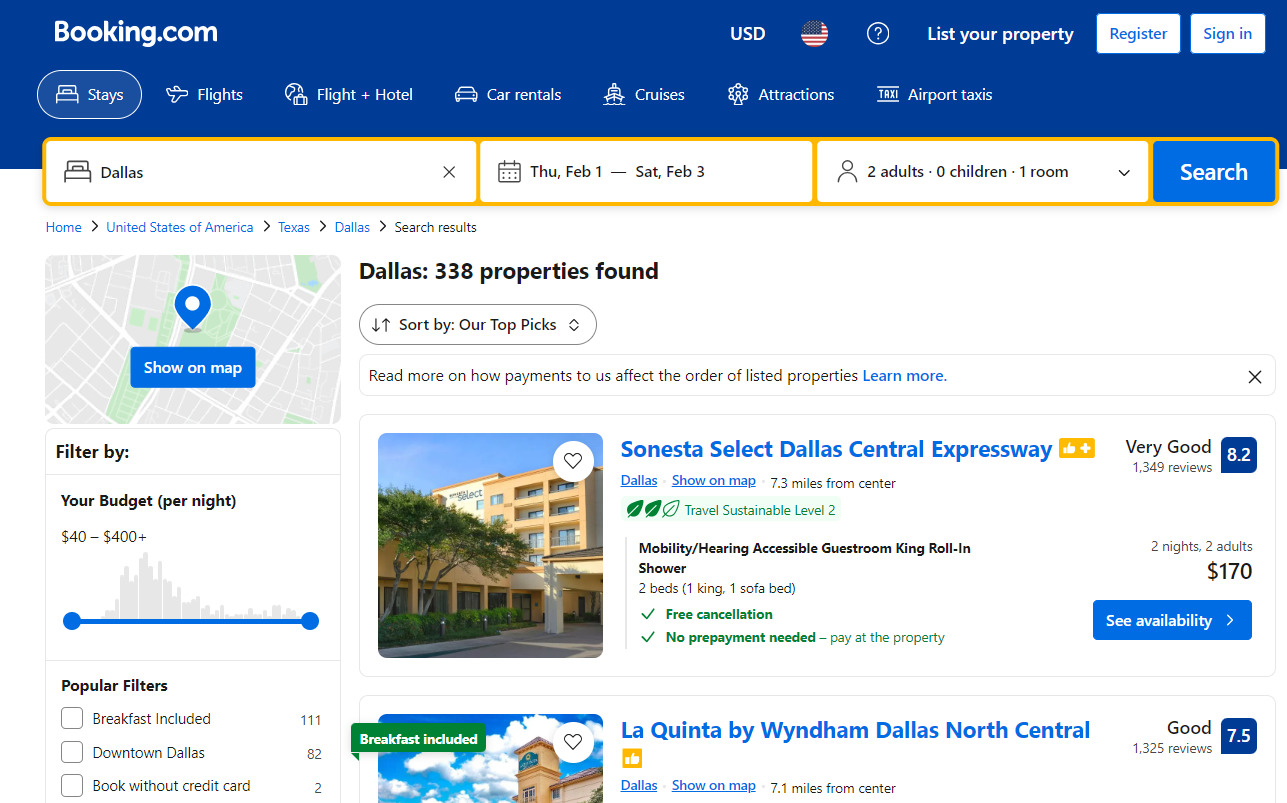
Traditional Filter Search | Source: Booking.com
Despite being straightforward and familiar to users, these search algorithms may not always be effective in the real estate context. For keyword search, for example, obvious drawbacks are:
- Lack of context. Keyword search rarely has the ability to understand the context, leading to potential misinterpretations of the query, and, therefore, irrelevant results. For instance, the real estate term ‘flat‘ may refer to an apartment, a characteristic, or informal pricing, leading to potentially irrelevant results.
- Limited understanding of user’s intent. It may not adapt well to changes in user intent during a single search session, consequently leading to results misinterpretation. This way if you searched for ‘London parks’ and then decide to find a place for your car to ‘park in London,’ you are likely to see more green spaces, instead of places to park a vehicle.
- Insufficient results for long queries. If the user learned a lesson and decided to include extra details in the query, surprisingly it may fail just as well. Extremely specific or long-tail queries may not yield accurate results, as the system will struggle to match the exact combination of keywords entered by the user. Apparently, if you are looking for a ‘three-bedroom family house Virginia parking garage,’ only a few of your requests will be fulfilled in the search results.
- Inability to understand language variations. Keyword search may not account for synonyms, alternate spellings, or variations of terms, potentially causing relevant content to be overlooked. Ambiguity in the keyword query which has multiple meanings often leads to irrelevant results, and even punctuation may cause trouble. So, ‘2 bathrooms house Dallas’ and ‘two-bathroom house Dallas’ can have very different search results.
- Dependent on the query quality. The quality of search results heavily depends on the accuracy and specificity of the keywords. Users who use vague, ambiguous, or not very specific terms may struggle to find the desired information. Golden mean between clarity and conciseness is a must when dealing with keyword search, but it may be troublesome to reach.
Filters and sorting on the other hand fall victim to the following drawbacks:
- Limited flexibility. With filter search, the user can only choose from pre-defined categories of properties, available on the marketplace. This way, there is a limited possibility of customized and personalized choices. The user cannot insert their own filters from the very beginning but has to look for the appropriate ones by scrolling down through a lengthy list, which means more time and effort spent on the search.
- Manual, time-consuming, and tiring. Filtering your way to the dream property may be tedious, lengthy, and boring: because of a huge variety of filters on marketplaces, the user is likely to spend a lot of time scrolling through options while searching for the appropriate place for rent.
AscendixTech Portfolio of Real Estate Marketplaces,
Communities & Property Portals
Check out the overview of the real estate marketplaces and portals we successfully delivered to our clients.
What is AI Property Search?
Natural language search is an AI-powered search that can understand and process queries in natural conversational language, rather than in specific keywords or structured filters. With the power of AI for real estate in natural language search, users can input the query using everyday language, either by typing or saying it, and the search engine uses advanced language processing techniques to comprehend the context and intent of the query to provide the most relevant results in AI for real estate.
Natural Language Search in Practice: Ascendix AI Property Search Example
Real estate AI search uses advanced technologies of deep learning and natural language processing to understand queries written in a conversational style. Unlike other, more obsolete kinds of search, nlp for real estate understands keywords, context, analyses the search intent, and can retrieve results based on these factors, which would be the most relevant.
Here’s an example of how AI property search can enhance user experience on real estate portals based on the latest AI for real estate developments by AscendixTech.
- The user enters the query into an AI property search chat in a simple conversational manner. For instance, ‘Find me cosy apartments in Paris for a long term, in a quiet safe area, the price should be $40-70 per day, ability to check-in any time, non-smoking, I expect Instagram worthy apartments.’
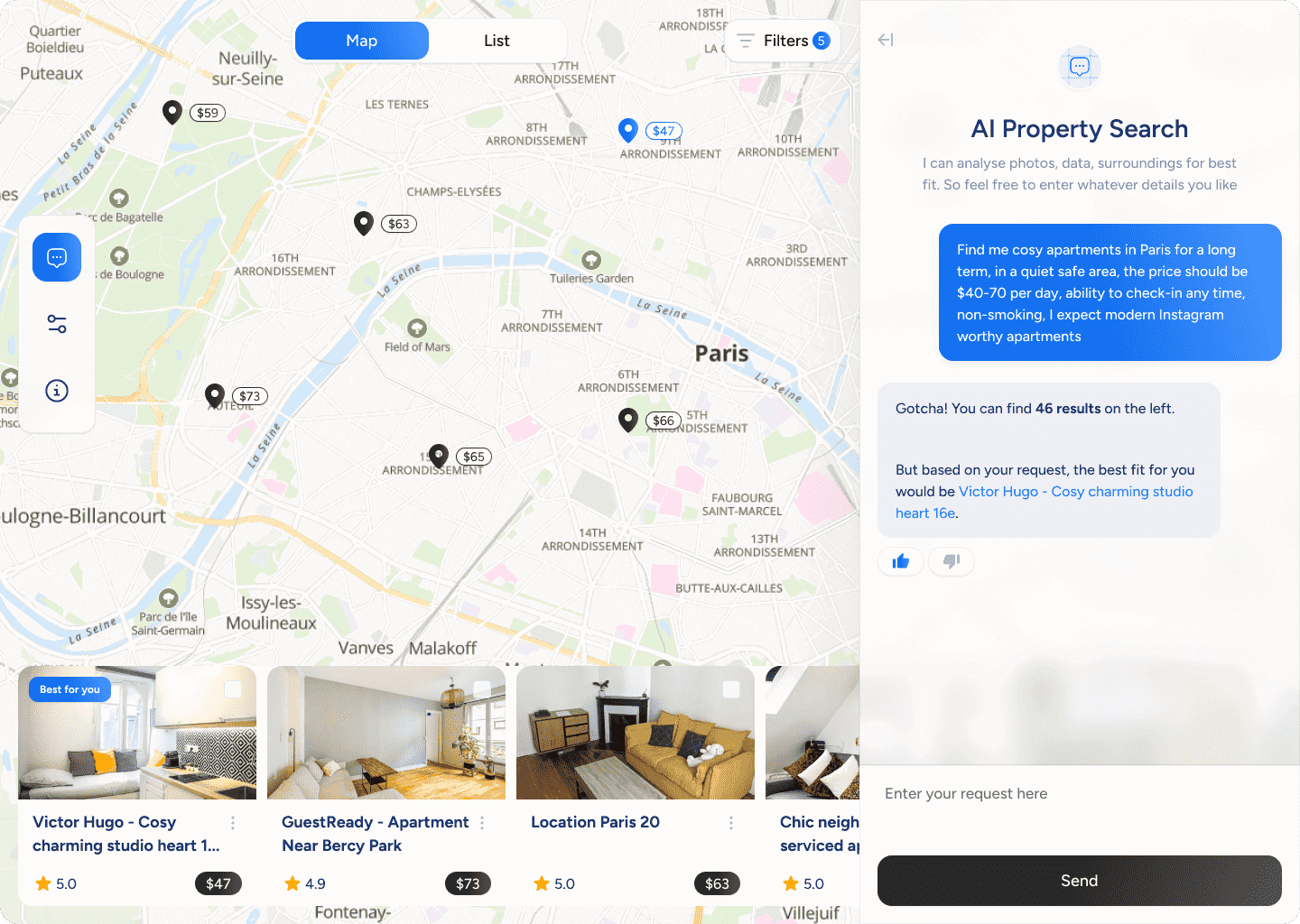
Natural Language Search for Property Listings
- The AI-powered chat (AI Completion model from OpenAI) automatically identifies the key requirements and keywords in the query, such as location, budget, desired amenities, and any additional preferences. It converts the user input to match the filtering options available in the system, and the AI Completion model suggests the search function with corresponding filters. Except for identifying formal keywords like ‘Paris‘ (location), ‘long-term’ (duration), or ‘$40-70‘ (price), AI property search can understand and transform semantically similar phrases into filters. For example, the user request ‘with a possibility to cook’ will be transformed to the formal filtering criteria ‘kitchen’, which will later be applied in the amenities field in AI apartment finder.
- When the function is called, AI property search narrows down the number of matching properties by applying the filters. For the remaining properties, the hybrid AI property search – a combination of Vector and Full Text in Azure Cognitive Search – is performed. If the user entered text that is not covered by the filters, it would be processed as a text query using AI Cognitive Search, meaning the semantic search NLP finds the closest common match to what the user asked for. Due to this, both the properties containing the keywords from the text query and those with similar meanings are found. For example, if the user searches for ‘sleek contemporary aesthetics’, the results provided by AI apartment finder will also include properties with ‘modern and minimalist design.’
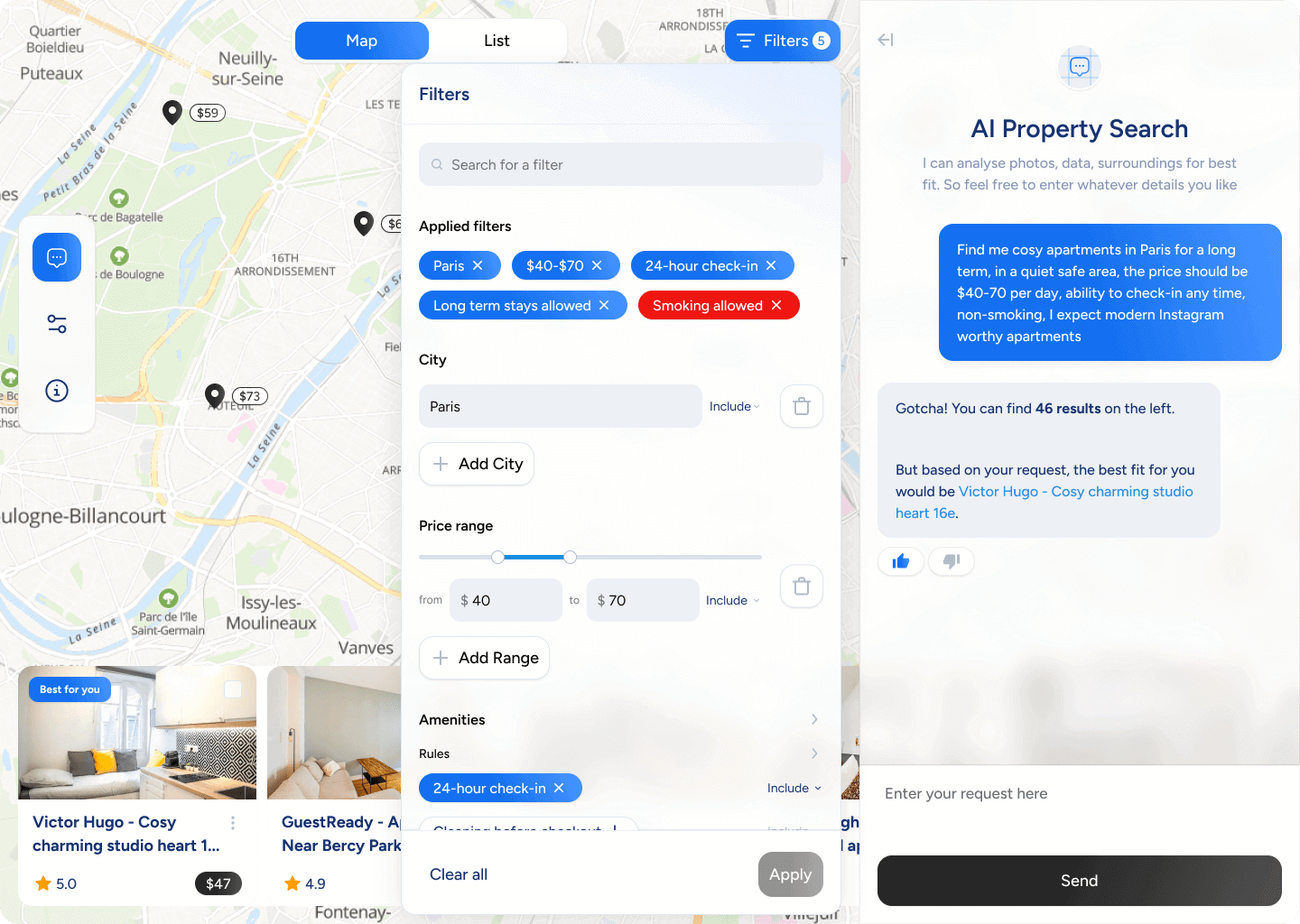
Automatically Applied Filters in AI Property Search
- After the main part of the natural language search has been conducted, the AI property search results are retrieved and ranked by relevance to the customer’s query. Real estate AI technology identifies the results that coincide with the search intent the most and shows them, starting from the most relevant and going to the least relevant ones or less interesting for the user. The apartment chatbot also can make a suggestion about which option the user might like the best.
- As the results are ranked and reviewed, the user may make some adjustments, if they think of some other features needed. There is also the possibility to remove the previously set filters, for instance, to disregard the property prices, or add ‘cleaning‘ to desirable amenities. Whenever the user alters their search criteria, AI-powered chat uses not only the most recent input but the entire conversation history for a better context understanding and providing the best results.
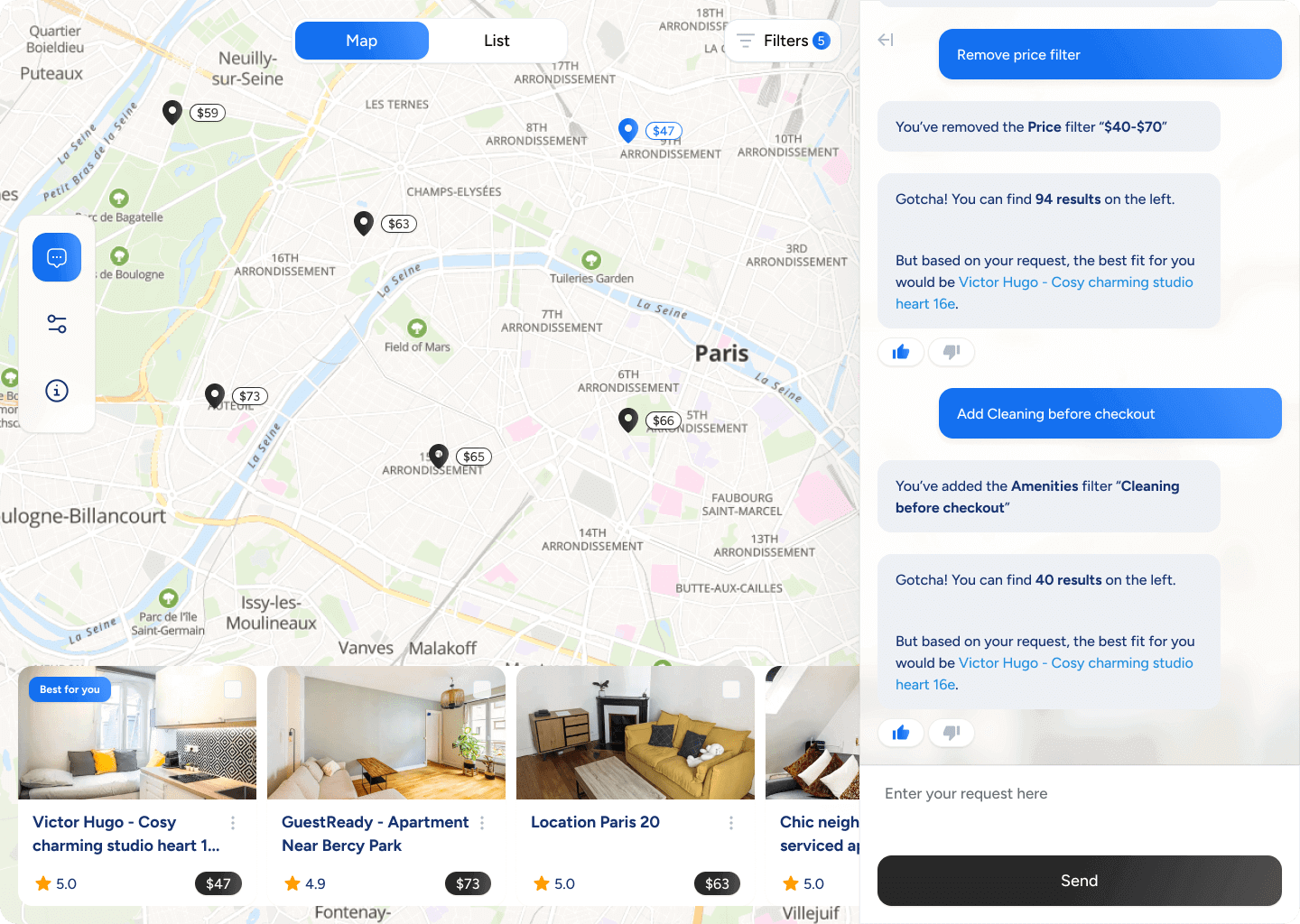
Adjustment of Filters in Natural Language Search
- To understand the context better, the chat saves the history of user queries and adjustments made to the initial request. Due to this, the semantic search LLM system can find ways to improve the search results and make them more relevant for a specific user within one dialogue in the chat. With the example of Ascendix AI property search, NLP for real estate agents improves and personalizes the results within a single search session, which means the end results are the most suitable to the user’s needs and desires, and if the person changes their mind about the property and wants to start from scratch, they can simply refresh the page and begin a whole new search.
Build a Custom Real Estate Software with Ascendix
Hire Ascendix and we’ll execute your vision and create a thriving real estate software product or bootstrap your existing solution.
The Fundamentals: Natural Language Search Flow
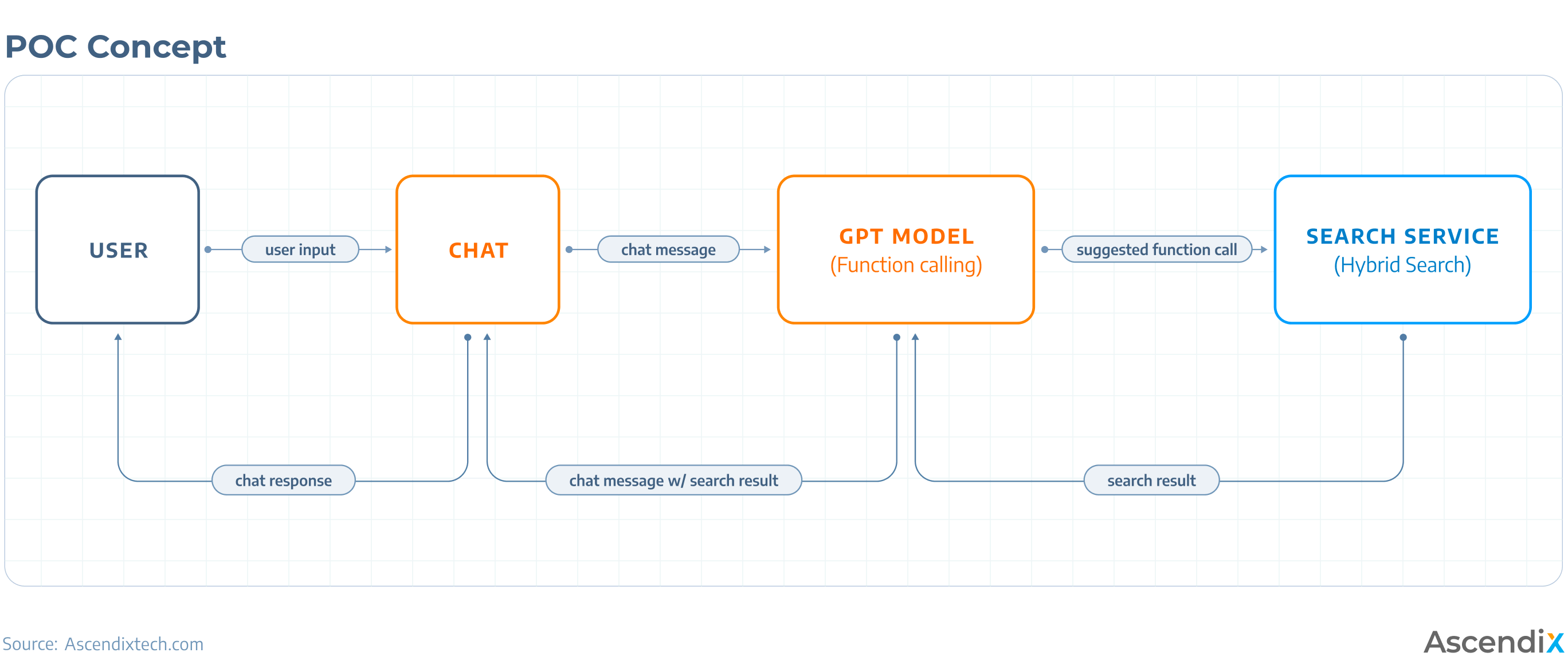
Stages of Natural Language Search | Ascendix AI Search
In the previous section, the process of real estate AI property search was described from the user’s point of view. The process is convenient, fast, and almighty. However, what happens behind the curtains of a seemingly easy process? The backstage algorithms include several essential steps:
- The user’s input (search query) is collected by the chat and the chat response is returned, usually for the clarification of the search criteria.
- The server forwards user messages to the ChatGPT completion model and it can suggest the function call. This means the server asks the GPT model to recommend or propose a specific action or operation to be performed based on the user’s input. For example, if the user started the query ‘I need a property…’ then the GPT model would first suggest the function ‘searchProperties,’ which is responsible for searching and returning a list of properties.
- The server validation stage follows. The server checks the suggested function (‘searchProperties‘) to ensure it’s appropriate for the search query and is safe to execute.
- The server executes the function suggested by the GPT model. Azure Cognitive Search performs the search request generated by the GPT model.
- Search results are retrieved and shown to the user in a chat message.
A more detailed view of the natural language search flow, integrating various technologies like Azure OpenAI and Azure Cognitive Search, is shown and described below:
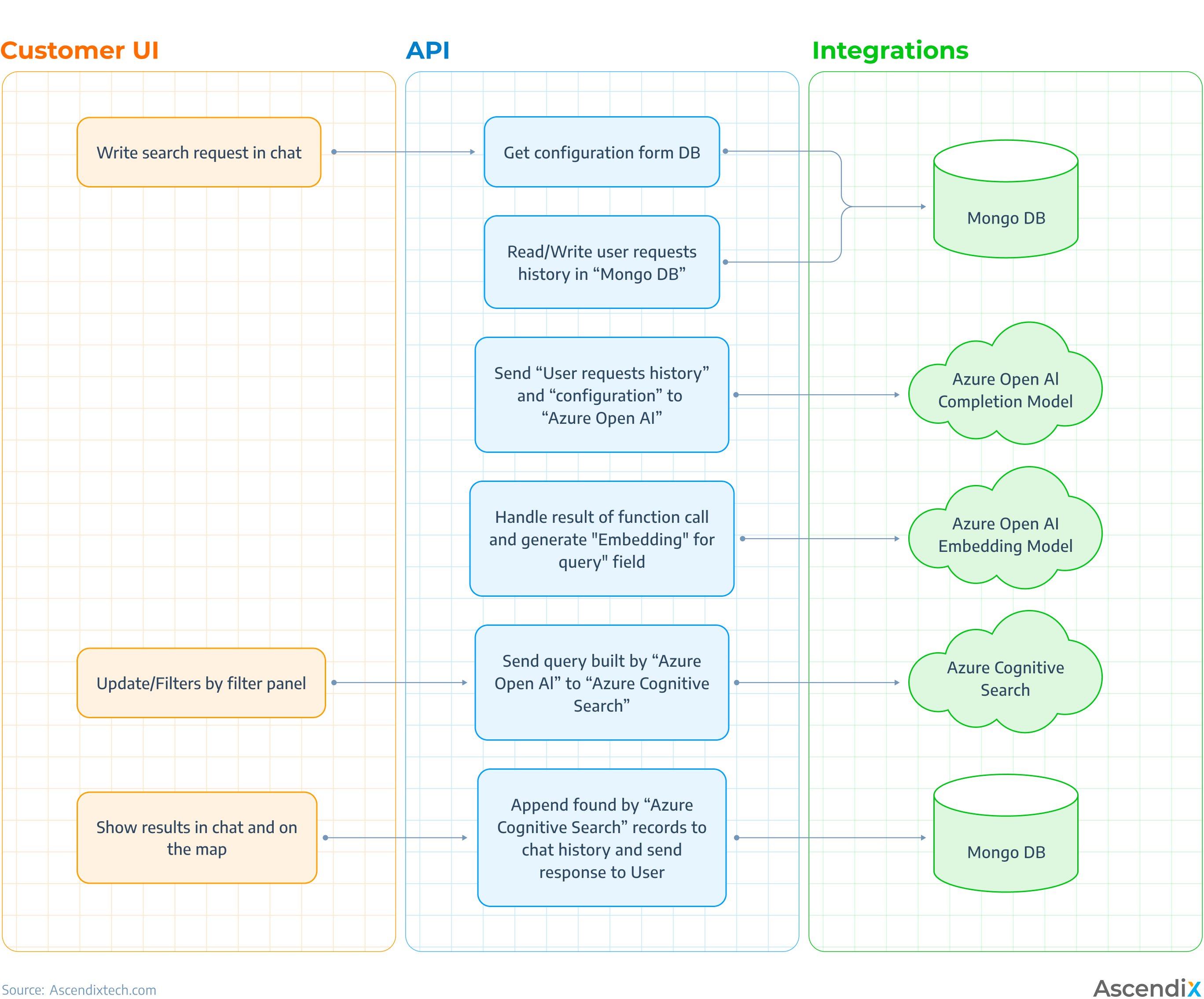
Natural Language Search Flow | Ascendix AI Search
- User Request. The user sends a request in chat, for example: ‘Hi, please find me a luxury apartment in New York for $200 per day with Wi-Fi and TV.‘
- System Configuration. The system retrieves the configuration from the database and the conversation history. The configuration describes rules on how the system should be run, defines the system behavior, sets restrictions, and describes the expected result of the search.
- Azure OpenAI Integration. This information is provided to Azure OpenAI, which can build the next search request based on the function definition configuration.
- Text Transformation: Embedding generation. The system processes the query text, analyzes it, breaks it down into major keywords, and then transforms the text into a vector representation (embedding).
- Azure Cognitive Search. This search query in the form of vectors is provided to Azure Cognitive Search. At this stage, a semantic search takes place: the system analyzes the combination of keywords in the query in an attempt to understand the context and the connection between the words.
- Context Storage. All the user’s queries from a single search session are saved in the database so that it is easier to return to a previous search query and get more relevant results.
- Result Display. The user can see the search results in the chat and on the map.
- Filter Panel. The filters, generated during the search process, appear in the web app so that the user can adjust the filters by removing the ones which may be no longer relevant. If this is performed, the system sends a direct request to Azure Cognitive Search with the new filter.
- Query Adjustment. After receiving the results, if it is needed, the customer can add details to their initial query by using the chat app. In this case, the search process is repeated, and the apartment chatbot learns and tries to find more relevant information depending on the adjustments made.
Natural Language Search Tool: Structure
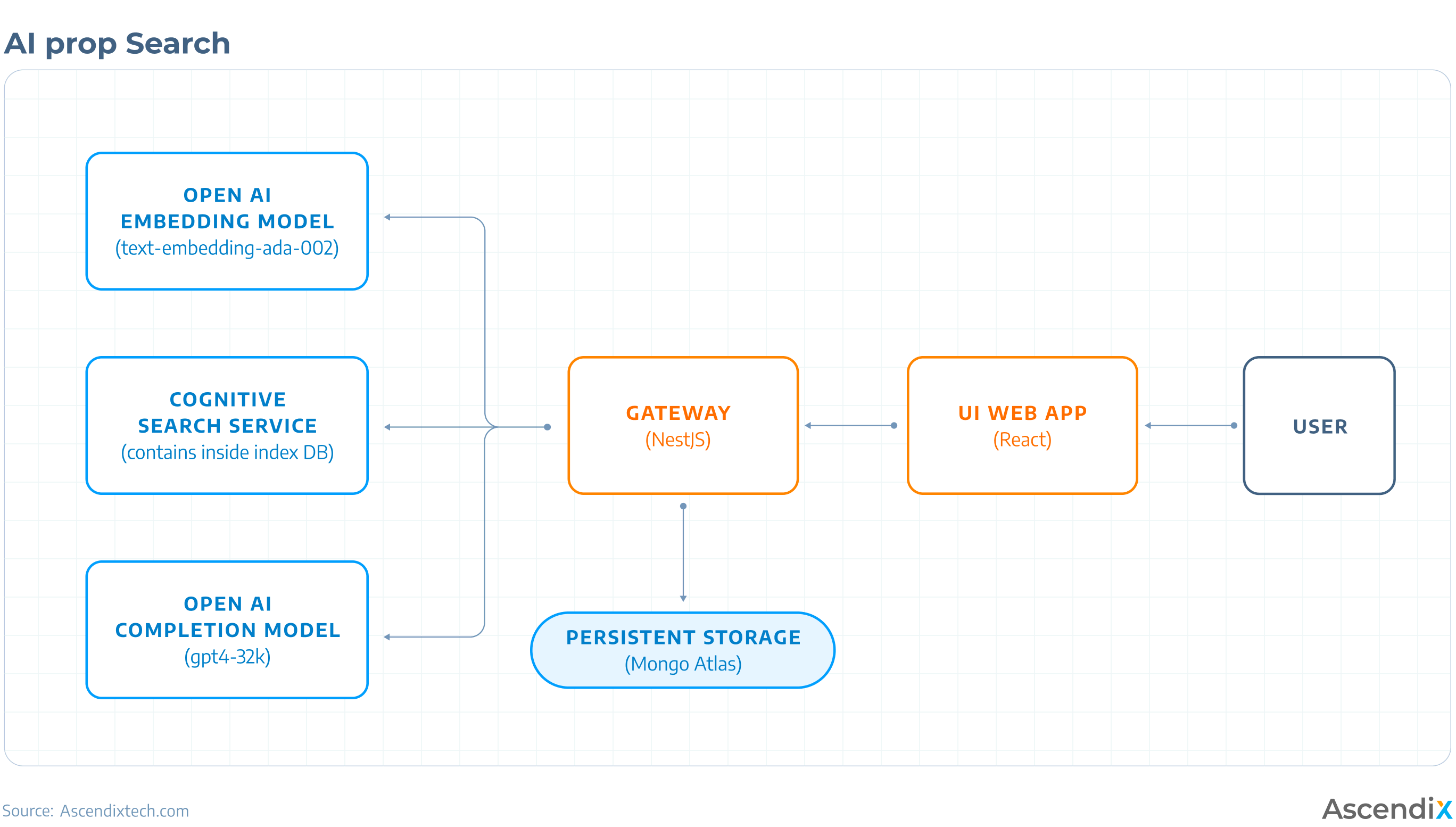
Structure of AI Natural Language Search | Ascendix AI Search
The structure of AI property search used by the Ascendix team consists of various components that in combination create synergy, allowing the best user experience and great results.
- The main element of the structure is a gateway service, which acts as a central coordinator or mediator that manages the flow of communication between different parts of a system. It orchestrates the communication between the client application, persistent storage, and AI services for search, generating embeddings, and chat completion. Ascendix used NestJS to create an optimal backend for system management and provide timely managed delivery of NLP real estate search results.
- User interface, also known as the client application, is the AI for real estate interface which the user directly interacts with during the search. It defines how convenient the search process would be. Ascendix team chose a web-based chat interface, built with ReactJS, where users type their messages and receive responses with relevant results and property locations.
- Persistent storage is used for storing and then retrieving data from the storage system based on user actions or AI search service results. It is responsible for saving the search query and remembering any information inserted by the user to optimize the relevance of search results. This aspect is also coordinated with the help of a gateway service. Ascendix team used Mongo Atlas for these purposes.
- The components mentioned previously are essential for any web app. However, the magic of real estate AI natural language search starts with the following elements. First, the OpenAI embedding model is used to generate vector embeddings to perform semantic search nlp. Generating embeddings is a process of transforming textual or other types of data in a numerical vector form. In other words, embedding generation is like translating human language to a set of numbers, which are easier for the software to process. Embeddings capture semantic information about the user’s query and are used to further understand the connection between words, context, etc.
- Azure cognitive search service understands user intent, context, and content semantics, this way providing more accurate and contextually relevant results. Its main features include natural language understanding, semantic search, personalization, content enrichment through sentiment analysis, various data types search support, faceted search for result refinement, and integration of machine learning for continuous improvement.
- OpenAI completion model is responsible for interpreting the user’s query and generating a search function based on it. For instance, Ascendix development team used Azure OpenAI gpt4-32k, which can generate natural language, is optimized for chat responses, supports extended context length, and has enhanced capabilities for optimizing NLP real estate overall.
How Can AI Property Search Help Users of Rental Marketplaces?
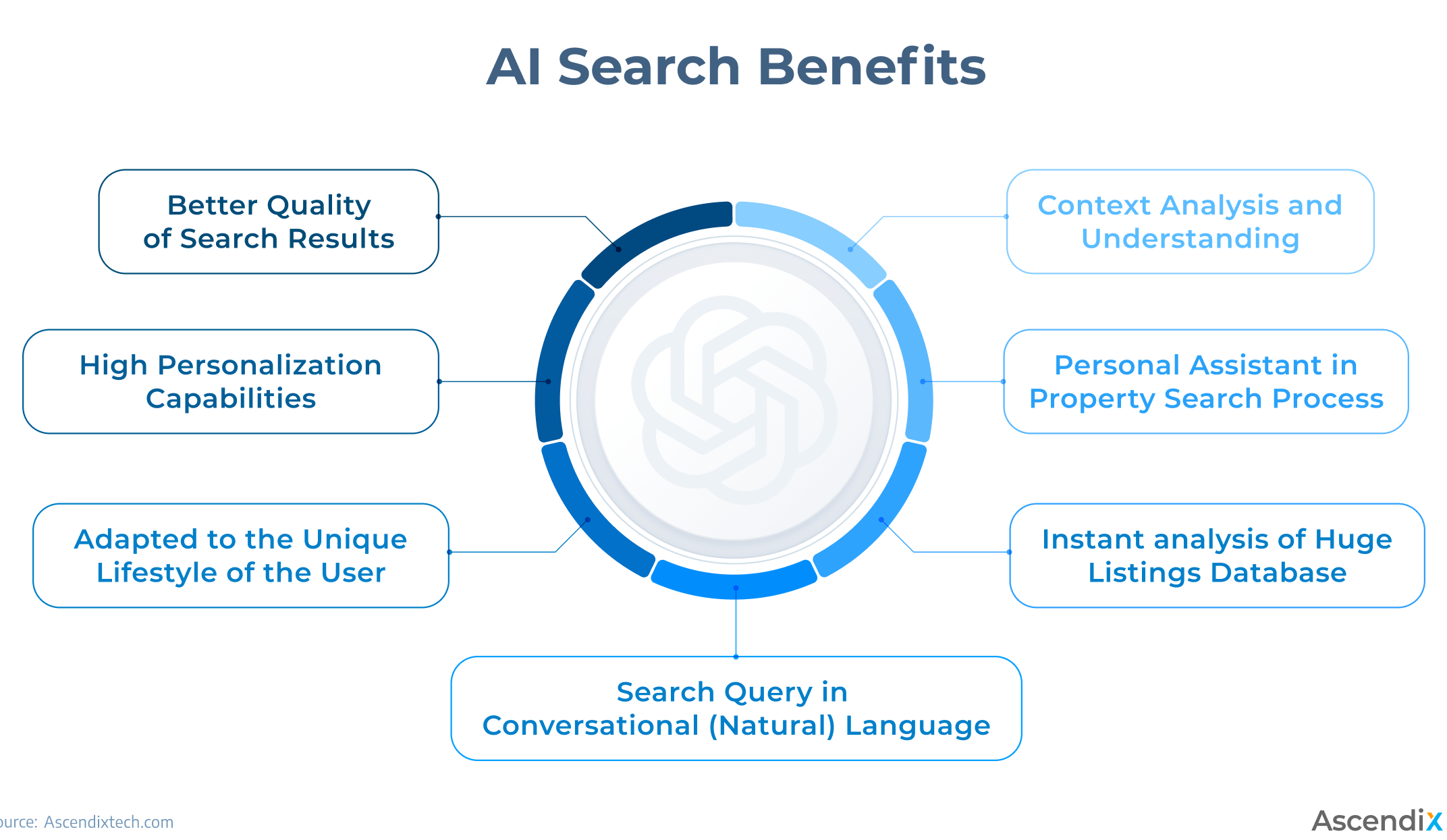
Benefits of Natural Language Search
Natural language search makes shopping on rental property platforms a pleasant and convenient experience for the customer, while at the same time, AI for real estate brokers enhances the selling and renting process.
Home buyers or prospective tenants enter phrases like ‘find a $700K home for sale in New Jersey with a backyard’ or ‘rent a house near me with three bedrooms’ directly into the search bar of AI property search tool, instead of bashing through a diversity of filters like state, city, house type, number of bedrooms, or other required amenities.
While seemingly simple, the natural language search offers a significantly better quality of search query results retrieval and ranking. Beyond basic criteria like bedrooms and bathrooms, buyers may consider various other features adapted to their unique lifestyle. Natural language search engine revolutionizes the home shopping experience, simplifying the lengthy and stressful house-hunting. It is an easy, modern way to search and presents relevant results in a clear and uncluttered manner.
AI search enables finding properties that are highly personalized for the tenant’s lifestyle and unique needs. The customers may choose not only by pre-set criteria but talk to the search engine as if it was a friend or personal assistant. They can ask AI property search for a ‘house for a family of three with a big master bedroom, two bathrooms, close to the city center and with parking’ and receive the most relevant results.
To provide such an impressive experience, the natural language search feature analyzes the context and connection between users’ queries and scans millions of listing details to give pertinent results. Simultaneously, the feature is used for training machine learning models, improving their ability to effectively respond to search queries in natural and human-like sentences.
Keyword and AI Search Features Comparison
| Keywords and Filters (Traditional Search) | NLP Search (AI Real Estate Search) |
| Manual input of keyword and specific property details | Conversational and more natural style of query |
| Limited flexibility because of pre-defined filters | High flexibility, can adapt to the user’s query |
| Complex queries are challenging to process | More complex and detailed queries provide the best result |
| Filters need to be adjusted manually | Filters are applied automatically |
| Low personalization capabilities | High personalization capabilities |
| In case of irrelevant results, the initial query needs to be rewritten from scratch | In case of irrelevant results, the query can be adjusted in process |
| The relevance of results depends on query quality | The results are high-quality and relevant even with mediocre query quality |
| Does not understand context | AI in real estate understands and analyzes context |
Comparison of traditional listings search and natural language search as a representation of AI for marketplaces.
Want to Integrate AI into Your Existing Solution?
See how AscendixTech can help you close more deals and improve your prospecting with the help of AI.
How Else Can Rental Platforms Benefit from AI Property Search?
Natural language search is not the only application of real estate AI for marketplaces. Marketplace search powered by AI helps the user find their way at the beginning of their marketplace journey. However, rental platforms can harness the power of AI in various other ways to enhance user experience and streamline operations.
- Leveraging Property Data. AI algorithms can be used to analyze and understand property data, like descriptions or reviews, facilitating better recommendations and personalized experiences for users. AI for marketplaces can provide a more tailored experience for the customer, meaning a higher level of satisfaction and convenience.
- Sentiment Analysis. Implementation of sentiment analysis tools gauges user feedback and reviews, enabling property owners and rental platform managers to understand customer satisfaction levels and areas for improvement. AI for marketplaces can grasp the readers’ mood from their style of writing in review, analyze it, and give the report, streamlining the process of finding bottlenecks in the real estate business and solving the existing problems.
- Chatbots with Generative AI and Search. Generative AI and natural language search models can be employed to power chatbots for automated and intelligent 24/7 customer support, providing required assistance in finding relevant information and enhancing user engagement. This way, generative AI will handle common queries, troubleshooting, and assistance, improving response times and customer satisfaction.
- Image Generation. Generative AI for marketplaces can produce not only text, but also visual results – images, plans, and other graphics. This feature can be used to visualize property renovations, allowing users to preview potential changes before making decisions, and understand the property size, location, and dimensions better. Real estate AI is especially valuable for home buyers who want to understand how furniture can be located in a specific room or where the closet or shelves could be made.
- 3D Model Creation from Floor Plans. Rental marketplaces often feature floor plans for the prospective tenants to assess the property in detail. AI for marketplaces can make this experience even better by creating detailed 3D models of properties based on floor plans. This takes the home shopping experience to a whole new level and can provide a comprehensive and immersive view for potential tenants or buyers.
- Attribute Completion. The AI and real estate algorithms can automatically complete missing property attributes, which leads to comprehensive and detailed listings. AI for marketplaces may ensure that the property is located in the correct category, has the right attributes and correct and proper description.
- Property Description Generation. Integration of real estate AI for marketplaces is a transformative opportunity for automating property description. AI can analyze the set of specified criteria and attributes and with the help of Natural Language Generation algorithms craft human-like textual descriptions of a property for rental marketplaces. This saves time, effort, and the imagination of real estate agents or owners, who may direct their creativity to more challenging or important tasks.
By incorporating these AI-driven functionalities, rental platforms can not only streamline their operations but also provide a more engaging and personalized experience for users in the competitive real estate market.
Ascendix and its AI Search for Property Marketplaces
Ascendix has the capability to create exclusive software tailored to the most exquisite needs and requirements, including the implementation of AI capabilities to improve the business.
Ascendix will boost your real estate marketplace with the help of a cutting-edge AI searching tool. The possibilities of natural language search enhance the customer experience on the rental platform and can help prospective tenants find the most relevant property tailored to their needs easier and faster.
The NLP real estate technology allows users to search for properties using natural conversational language. Ascendix team also included the map visualization to make sure the users are fully aware of where the most relevant properties are located. This way, customers get the best properties suiting their needs quickly and conveniently.
With Ascendix AI and real estate expertise, rental marketplaces can be enhanced with AI, meaning improved user experience, faster and more relevant search results, and meeting and exceeding customer expectations about desired property features. The solution can be tailored for each marketplace, which provides the highest flexibility to meet the requirements of your business.
Ascendix as a combination of real estate and AI expertise
- With our extensive expertise, industry experience, and reliability, we have garnered the trust of major real estate players such as JLL, Colliers, and Hanna Commercial, streamlining their business workflows effectively.
- With over 20 years of experience in the real estate industry and a dedicated focus on proptech development for 16 years, we bring unparalleled industry knowledge to the table.
- Our skilled team are professionals in software development and AI integration with a focus on the real estate industry’s needs and wants, which enables us to produce innovative and high-quality AI-powered solutions.
- Headquartered in Texas, our global presence spans five offices, enabling seamless collaboration across continents.
How Can We Help Real Estate Marketplace Owners?
- Adapting our services to your specific requirements, we can design custom real estate software for individual marketplace owners looking to enhance their operational efficiency with the help of AI.
- For real estate professionals, we specialize in integrating and customizing AI solutions within their existing real estate software infrastructure, meaning enhanced experience for customers.
- For those who already have a rental marketplace, Ascendix’s expertise in integration and development can ensure that AI natural language search elevates the customer experience on the platform and streamlines existing operations.
Yana Yarotska
Yana is a proptech enthusiast and a technology fan. In her articles, she explores the world of real estate software, including proptech news, useful resources, and real estate technology insights, assisting everyone involved in the industry to modernize and optimize their business.







